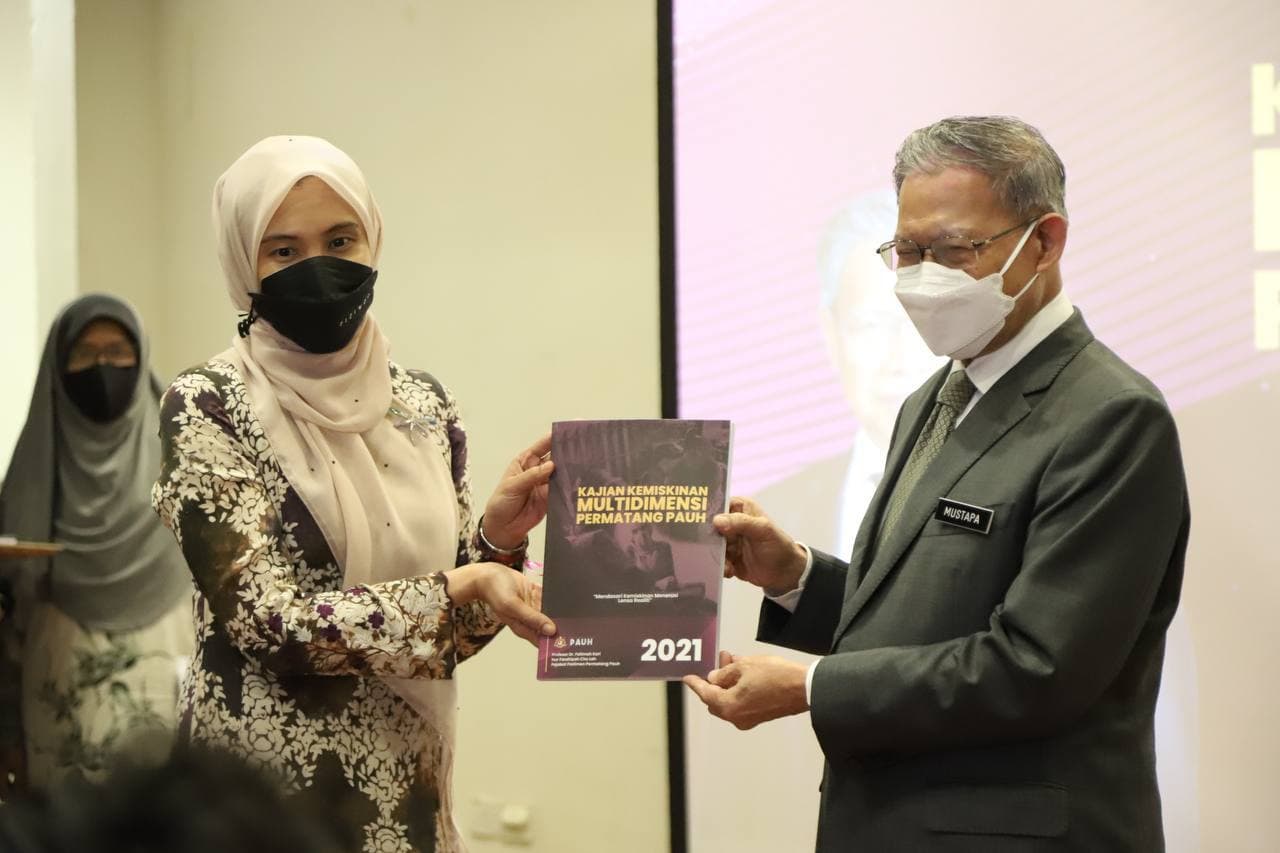OCTOBER 22, 2021, KUALA LUMPUR – A new study launched yesterday by YB Nurul Izzah Anwar shows the impact of COVID-19 on poverty.
The Permatang Pauh Multidimensional Poverty Index Report 2021, launched in collaboration with YB Nurul Izzah Anwar, Member of Parliament for Permatang Pauh and Professor Dr Fatimah Kari, former Professor of Economics and Director of the School of Poverty and Development at the University of Malaya, details the development of the Multidimensional Poverty Index (MPI) as an alternative and realistic method of measuring poverty rates based on the dimension of basic needs among poor households. A higher MPI score indicates a higher degree of deprivation.
YB Dato’ Sri Mustapa Mohamed, Minister in the Prime Minister’s Department (Economy), who delivered the closing address commended the Permatang Pauh office on its efforts to eradicate poverty in Malaysia through a multidimensional index study in the Parliamentary constituency, while also engaging local youth as enumerators of the study. He was of the opinion that the Permatang Pauh MPI study could be replicated across other constituencies to produce a more comprehensive poverty measurement.
He expressed interest in the quantum of financial expenditure required to improve existing multidimensional deprivation faced by the B40 segment in Permatang Pauh. He stressed the need for bipartisan cooperation to comprehensively tackle and eradicate poverty in Malaysia – and to eventually reach 3.7 percent by 2025.
Women Heads of Household Are More Vulnerable to Poverty
The report found that women heads of households have a much higher deprivation score in each dimension of poverty than their male counterparts, particularly in the dimensions related to home teaching and learning, job or income loss, and discomfort brought about by the MCO. The high deprivation of the home teaching and learning dimension among children of female-led households carries serious implications and needs to be addressed with a comprehensive policy strategy.
The average education level score of single mothers is lower compared to the average head of household schooling level. The average basic income for heads of household is RM2,131.85 per month, compared to RM1,451.71 per month for those that are women-led (68.1% of the average). The education impact index on income also differs, with a score of 0.73 compared to 0.62 of single mothers; as coefficient / impact factors – the higher the score, the better the wellbeing.
B40 Children Experience Nutritional Poverty and Risk Becoming a ‘Dropout Generation’
Poverty among children is a national tragedy that carries its burden forward to affect future generations. This study recorded a low deprivation score within children in terms of water supply (0.079) and electricity (0.07). However, the deprivation score in terms of housing and sanitation was found to be relatively moderate at 0.344 and 0.278 respectively.
From the perspective of child poverty, almost all indicators related to the COVID-19 dimensions showed high exclusion rates, such as per capita expenditure on food, and home teaching and learning, which recorded rates of 0.966 and 0.877 respectively. The MPI study which accounted for the measurement of deprivation in home teaching and learning among children during Covid-19 was the first to be conducted in Malaysia.
This finding shows the high levels of exclusion in food expenditure per capita indicates that poor families cannot afford to buy adequate food, with children facing critical levels of food poverty, represented by almost 60 percent of households in the study sample.
The level of Poverty Line Income (PLI) modified to factor in COVID-19 was found to be RM 2,151; almost 8 percent higher than the value of the PLI for Penang in 2019 (RM1,989). The modified PLI here is to account for:
- The existing weaknesses in the PLI 2019 methodology, especially considering non-food expenditure.
- The effect of COVID-19 (Covariate Shocks), where households have had to spend on health items and personal protection which becomes more costly if the family size is large.
- COVID-19 affecting the increase in general costs and expenditure due to the impact of the MCO on the logistics of the economic system.
Open, shareable and integrated data is the way forward to eradicate poverty
The findings of the Permatang Pauh MPI survey have also been submitted to the Department of Statistics Malaysia (DoSM), an agency which serves as the country’s premier data centralization agency and has the capacity to conduct a more detailed census. Chief Statistician Dato’ Sri Dr. Mohd Uzir Mahidin was also present during the launch of the Permatang Pauh MPI report.
Reciprocal support across agencies is in line with Khazanah Research Institute’s (KRI) open data policy recommendations for academic research purposes. As a measure to reflect the true reality of poverty, the Poverty Line Income (PLI) should be reviewed to take into account household spending patterns and cost of living more accurately with the immediate implementation of PLI 2019, which is RM2208 per household. It is important to note that cash aid in 2020 utilised the old PLI of RM980 per household.
The drafting of the 12MP is more challenging compared to the previous five-year plan as absolute poverty has increased to 8.4% in 2020 due to COVID-19. The incidence of poverty decreased significantly from 16.5% in 1989 to 5.6% in 2019 based on the 2019 PLI methodology. Nevertheless, although the Malaysian economy has recorded a relatively high growth rate over the past 30 years, economic imbalances continue to persist and unequal economic structures remain, including spatial growth imbalances, inequalities between income groups, high unemployment among youths, rising cost of living and industries that focus on the lower end of the production value chain.
The four-month study (with planning starting as early as 2019) was presented as a report by Professor Fatimah Kari, who detailed how this was a pilot program to identify and confirm the need for a more holistic approach to poverty measurement in Malaysia, by considering the local and geographical context – and most importantly, the overall impact of COVID-19 on our most vulnerable segments.
This study used nine main dimensions, six of them considered conventional with the remaining three specific to the pandemic. Conventional dimensions such as housing facilities recorded the highest deprivation score, followed by education, sanitation, water supply, health, and electricity. The three main indicators related to the COVID-19 pandemic showed relatively high exclusion scores – particularly those related to residential home comfort; job loss, and businesses affected by the Movement Control Order (MCO); as well as home teaching and learning.
In line with Permatang Pauh’s MPI findings, YB Nurul Izzah also reiterated the need to utilise gender based lenses in the planning and spending of the government’s Budget 2022; as well as to consider universal child benefit as recommended by KRI.
“The government will have to take a serious look at progressive taxation as a mechanism to finance sufficient aid and a holistic safety net for the rakyat; windfall tax, for example – as suggested by KRI in their recent report,” she said in her speech.
The launch event continued with an online webinar session entitled “Gender Implications of the Multidimensional Poverty Index: Gender Responsive Budget Policy Proposals”. The panel of speakers included Professor Fatimah Kari, Dr Melati Nungsari from Asia School of Business, Puan Hawati Abdul Hamid from Khazanah Research Institute, and Yu Ren Chung from the Women’s Aid Organization. The physical launch event was conducted in accordance with the existing COVID-19 SOP, with appropriate physical distancing, and self-testing kits available on site.
PERMATANG PAUH PARLIAMENTARY OFFICE
22ND OCTOBER 2021
For further information, please contact Jannah Jailani / Nadia Nazri via email at
jannahjailanimj@gmail.com / nadiafathinsyahira@gmail.com or Tel: 04-522 1463.





